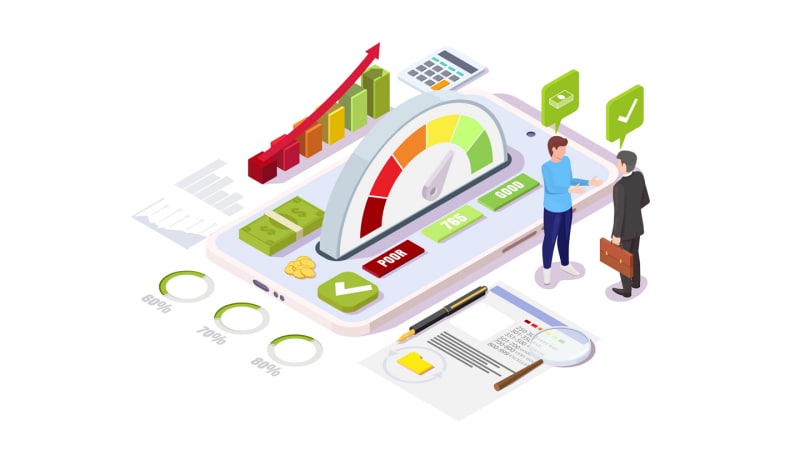770 credit score: A guide to credit scores

Quick insights
- A 770 credit score is considered “good” by VantageScore® standards and “very good” by FICO® score standards..
- A 770 credit score can give you better access to financial opportunities, such as mortgages and auto loans, so it’s important to protect it.
- Improving a 770 credit score may take some patience and extra steps, but it is possible to achieve.
If you’ve checked your credit score recently and felt confused about which credit range it falls into, don’t worry—you're not alone. Credit scores can be labeled differently depending on the scoring model used. In this article, we’ll break down what a 770 credit score means.
Understanding a 770 credit score
To help you understand what a 770 credit score means, it’s helpful to understand the way the two main scoring models, VantageScore® and FICO® score, break these numbers down.
As of May 2024, VantageScore® ranges are:
- Excellent: 781 to 850
- Good: 661 to 780
- Fair: 601 to 660
- Poor: 500 to 600
- Very Poor: 300 to 499
As of May 2024, FICO® score ranges are:
- Exceptional: 800+
- Very Good: 740 to 799
- Good: 670 to 739
- Fair: 580 to 669
- Poor: 579 and below
As you can see, a 770 credit score is considered good by VantageScore standards and very good by FICO standards. But what’s the meaning of a very good or good credit score?
Falling in these ranges usually indicates responsible credit management and a higher likelihood of obtaining credit at more favorable terms. A 770 credit score can demonstrate creditworthiness to lenders and you are likely to qualify for competitive interest rates and terms. You may even be able to have opportunities to take out credit cards with more premium perks. Bear in mind, however, that credit scores are not the only factor that is evaluated for these financial opportunities. Let’s explore in more detail below.
Maximizing borrowing opportunities with a 770 credit score
With a good/very good credit score, you may qualify for competitive interest rates on loans and credit cards than individuals with lower credit scores. For example, you may be able to take out more premium credit cards than someone with a lower score. These cards may even come with lower annual percentage rates (APRs). Note, however, that many premium cards come with high annual fees, so it’s important to check this as you take out new credit cards.
Additionally, your chances of qualifying for auto loans and mortgages are better than someone with a lower credit score. Let’s discuss this further below.
Buying a car with a 770 credit score
Purchasing a car may be possible with a 770 credit score, but it’s important to note that different dealerships and lenders may use different credit scoring models and different scales to make their own loan decisions, which could impact your loan terms and approval odds.
Even with a “good” credit score, you may be declined, subject to higher interest rates or need to provide a larger down payment than if you had a higher credit score.
To help improve your chances for approval, it may be beneficial to add a co-signer to the loan—if the lender allows—to share financial responsibility. Take note that while important, your credit score is just one of several factors lenders take into account when approving a loan.
Buying a house with a 770 credit score
Buying a home with a 770 credit score may be possible, but it may be more challenging than if you had an excellent credit score. Some lenders may require a larger down payment, charge higher interest rates or have stricter loan terms.
Whatever you decide, carefully review and compare different lenders and loan options to find your best fit for your specific circumstances. Remember, credit scores are just one of several factors lenders use when approving home loans.
Raising your credit score from 770 to 800
Even though a 770 credit score may grant you access to credit opportunities, you might feel motivated to take things to the next level. You may want to be extra diligent to boost your score from 770 to 800 and beyond.
First, remain proactive. That means keep doing what you’ve likely already been doing to obtain your current score. This includes paying bills on time and keeping your credit utilization ratio low.
Next, consider the following tips to help improve your score:
- Monitoring your credit report for any signs of suspicious financial activity and taking action if you find inaccuracies by reporting them to the credit bureau(s).
- Protecting your information, such as your Social Security number (SSN) from potential identity theft.
- Diversifying your credit mix by taking out a different type of credit (for example, a personal loan instead of another credit card) to showcase your ability to manage multiple types of accounts. Note that your score may dip temporarily due to lenders having to run a hard inquiry.
- Consider enrolling in Chase Credit Journey®, a free online tool anyone can use to check their credit score without impacting it. You may also use the credit score improvement feature. With this feature, you can receive a personalized action plan, provided by Experian™, based on your credit behaviors and credit score goal to help improve your credit score over time.
- Managing your debt-to-income ratio. This means that even if you get a salary increase or take on an extra source of income, try to keep your spending low.
In summary
With a 770 credit score, you are likely already well on your way to solidifying a positive financial foundation for yourself. You’ve probably developed healthy habits and consistency. Now you have to protect it, meaning you must remain proactive when it comes to monitoring your credit. It could take some time to improve your score further, but it is still not impossible.



